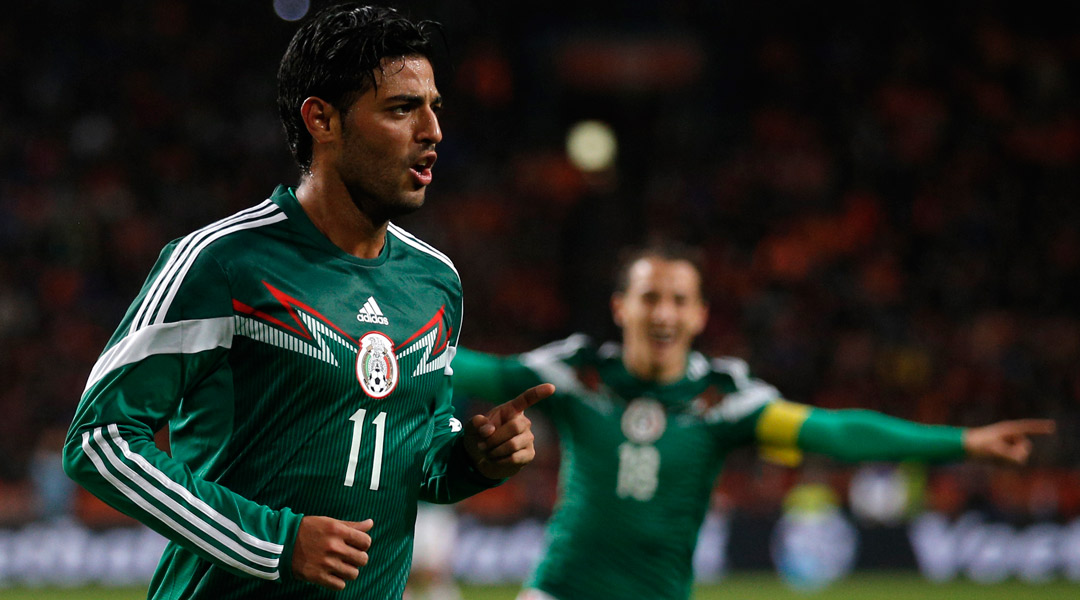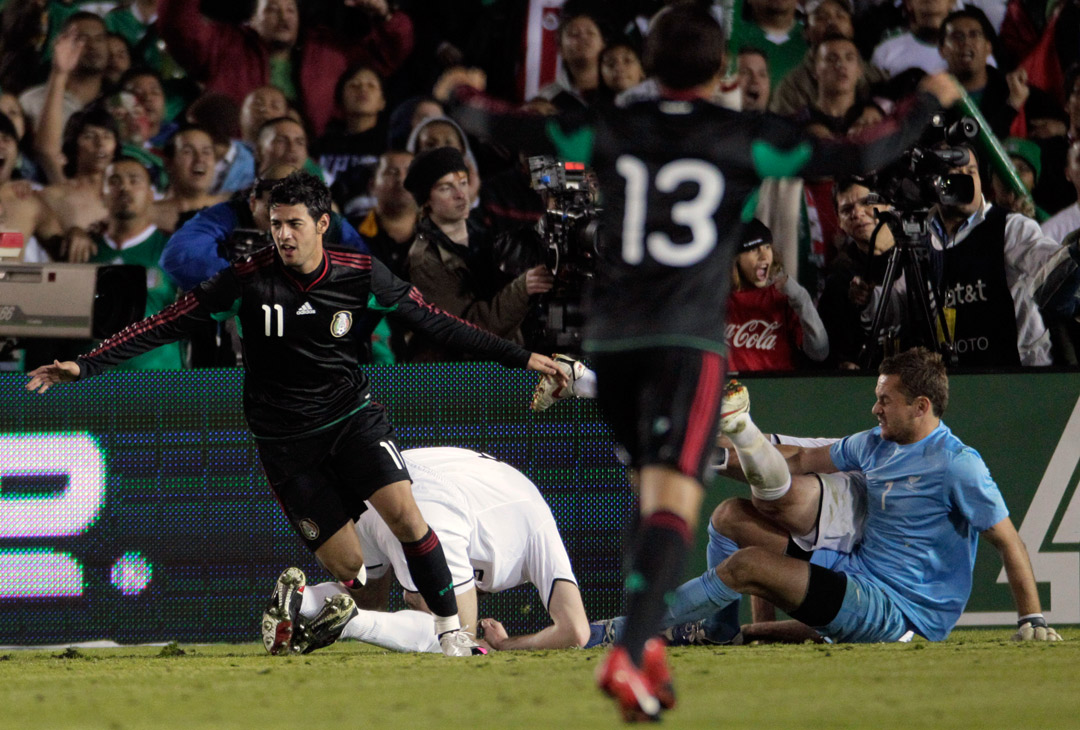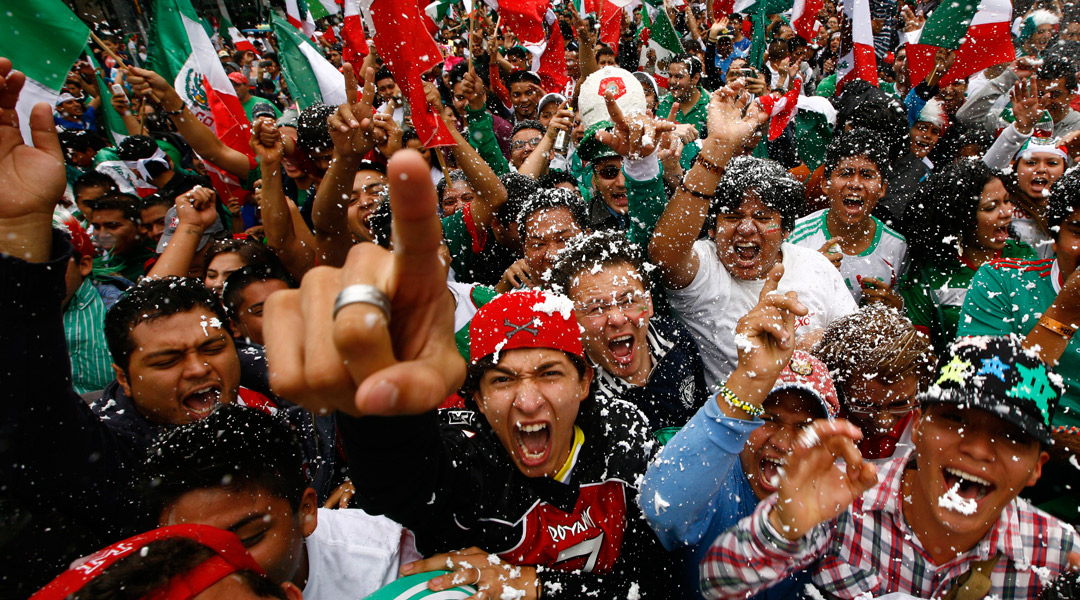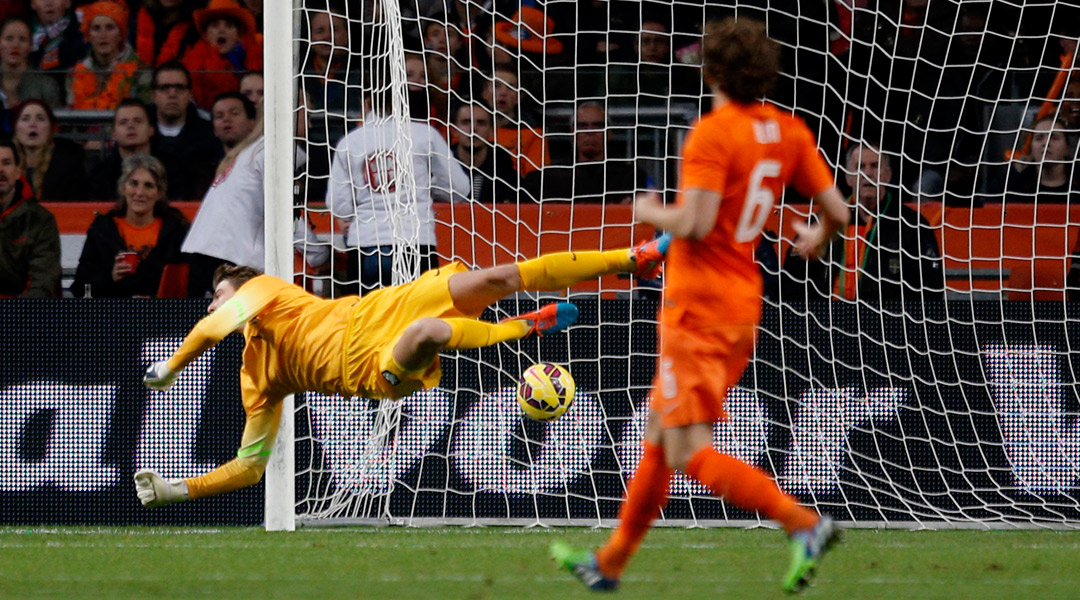The curious case of Carlos Vela: Arsenal whizz to Mexico outcast – but back with a vengeance
Lee Roden charts the fallouts, snubs and missed medals of the former Gunner's peculiar international career, after a two-goal return against the Netherlands last week...

On November 12 2014, Carlos Vela pulled on the Mexico shirt for the first time in three-and-a-half years. Despite repeated attempts to convince him otherwise, the forward had failed to turn out for El Tri since March 29 2011.
Yet at the Amsterdam Arena last week, Vela finally ended his self-imposed exile, returning with a brace that reminded everyone why he was pursued so relentlessly in the first place.
The Real Sociedad man was the key architect in Mexico's 3-2 revenge victory over the Netherlands, after the latter snatched it late in the last 16 at the World Cup. Speculation over what could have been in Brazil was only natural.
So what exactly drove Vela to pass on one of the greatest international tournaments for years, not to mention countless other caps and even major honours with his nation? There are several theories.
The bad bash
Vela’s relationship with international football first started to turn sour in 2010. In September of that year, he and several other players partied in Monterrey while on Mexico duty.
The local press went to town and speculated exactly what it may have entailed. (Let’s just say the inspiration could easily have come from Brazil legend Ronaldo, who fell foul of similar events.) The punishment was a significant ban, keeping Vela et al out of the international fold for six months.
Get FourFourTwo Newsletter
The best features, fun and footballing quizzes, straight to your inbox every week.
The then-Arsenal striker returned for a friendly with Paraguay in March 2011 – playing a mere 15 minutes – and three days later was given only 45 in Mexico’s clash with Venezuela.
In a move that looked suspiciously like prolonged punishment for his wrongdoings, he was then overlooked for the 2011 Gold Cup in June, missing out on a winner’s medal as a result. The rejection seemed to dampen Vela’s enthusiasm for international football, as he would fail to appear for Mexico at the Copa America a month later – despite being included in the squad this time.

The Mexican federation’s official explanation was that Arsenal refused to release Vela for international duty, but the London club denied that was the case.
What is certainly true is that as the months and the conspicuous absences rolled on, Vela’s excuses were rarely consistent. By February 2012 he had rejected another call-up, citing ‘personal issues’ on this occasion. Soon after he would resist a further opportunity at a particularly high cost.
With the 2012 Olympics on the horizon and Vela playing well in his first season at Real Sociedad, he was an obvious candidate to represent his nation at the tournament. The striker was due to return to Arsenal from his loan in the summer, so the location for the Olympics could hardly have been more ideal.
In April of that year he gave supporters reason for optimism by admitting he was “looking into the possibility of playing” in London but first needed to “speak to the people from the Mexican federation and see if I’m under consideration or not”. Consider him they did, and Vela was asked to participate.
But bizarrely, given his previous words, he politely declined. The player put forward yet another excuse. “I have to have a good pre-season and get to know my coach,” he insisted. “I don’t want to arrive at my club with competitions already underway and me having to play catch-up."

The price of a good pre-season couldn’t have been higher for Vela. Mexico won gold in men’s football for the first time ever, beating Brazil in the final. Saying no to this meant Vela wasn't part of a unique moment in his nation’s history. Yet even that wasn’t enough to sway his mind for the foreseeable future. Two years later he made another significant sacrifice, turning down the World Cup in Brazil.
Gold rush
Vela broke the 20-goal mark at club level for the first time in his career in 2013/14, so he couldn’t have been better prepared to make an impact at South America’s first World Cup since 1978.
Coach Miguel Herrera even travelled to Spain to meet with the striker and plead his case in person. Still, Vela couldn’t be convinced. The excuse had morphed again, Vela now claiming he wasn’t “100% mentally prepared to return to the team”.
The 25-year-old not only missed out on all the glory and memories that a World Cup can create, but also the wealth, with some $9 million awarded to his nation for their participation. Perhaps Mexico even missed out on a place in the quarter-finals as a result of his absence.
On top of his significant financial and professional losses, things also got personal. Vela’s consistent refusal to play for his country led to an inevitable backlash among sections of the Mexico support.
He wasn’t the only person to feel their wrath. “My mum used to read the papers or catch things on the TV, and I saw her suffering,” his brother Alejandro revealed. “She used to have shouting matches with the journalists through the television.”

But something changed for Vela after the World Cup, perhaps in light of the stress put on his family. The forward became more receptive to the idea of returning, and in October, sensing that shift, manager Herrera decided to take a punt. Finally, Vela answered the call.
Conscious of the need to deflect focus from the player to minimise the media circus, the Mexico coach tried to be nonchalant about the breakthrough, discretely announcing it on Twitter by saying he could assure fans: “All the Europe-based players in the squad list will turn up, 100% confirmed.”
Despite not mentioning Vela’s name, Herrera was soon retweeted nearly 3,000 times – there was little doubt over who the draw was. The immense pressure meant Vela needed to produce something special upon his return, and in Amsterdam he did just that. After eight minutes he curled a left-footed shot past Tim Krul from outside the area, the sound of the ball thumping the net clearly audible on the television coverage.
The forward’s second was equally impressive, made by an excellent first touch from a long ball that took him just inside the opposition area. As well as the goals, his understanding with Javier Hernandez looked sharper than ever. As far as comebacks go, it couldn’t have gone any better.
Dutch courage
By felling the team that broke Mexican hearts at the World Cup, any doubts over whether Vela was worth chasing were silenced, but one question remains: what changed his mind?
The positive line being spun is that players like Giovani dos Santos and Hector Moreno convinced him he would be welcomed back with open arms.
Other Mexican outlets provide a more compelling explanation: they insist the real reason Vela said no for three years is that former Fulham defender Carlos Salcido had blamed the striker for organising the infamous party in Monterrey, leaving his compatriot feeling betrayed. In August, Salcido retired from Mexico duty. In October, Vela had a change of heart. The timeline is accurate at least.
Vela’s brother Alejandro thinks there is a simpler explanation: maturity. “Carlos has given it some attention, taken things seriously and found some balance that he perhaps didn’t have when he was younger."
Perhaps the real reason is a combination of all three theories. Regardless, with both the Copa America and the Gold Cup on the horizon in 2015, Mexico are thrilled to have him back. From the striker’s point of view, after missing out on two significant international honours, he now has the chance to win two in the space of a year.
At 25 he should have at least one good World Cup left in him, too. As for the supporters, Vela’s brace against the Netherlands has converted him from villain to hero. How long it lasts is up to him.
